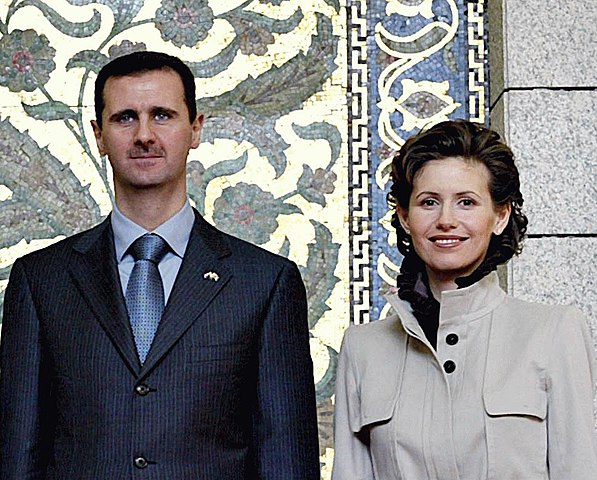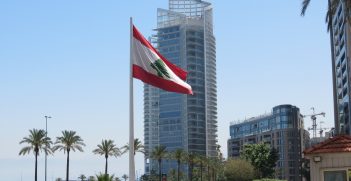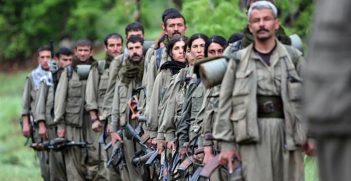From 'Vogue' to Civil War: The Rise and Fall of Asma al-Assad

The public image of the first lady has been important to the Syrian government before and during the war. Who really is Asma al-Assad?
In March 2011 Vogue magazine published an article ‘A Rose in the Desert’ that honoured the chic style of Syrian First Lady Asma al-Assad. Not long after the publication of the article, a brutal and seemingly never-ending war broke out in Syria in which President Bashar al-Assad and his opponents have committed numerous atrocities against innocent civilians. Today, any official evidence of the Vogue article is all but gone. So who is the First Lady of Syria?
Asma al-Assad was born in London in 1975 to a Syrian diplomat and a cardiologist. A graduate from King’s College with a bachelor’s degree in computer science and French literature, she had just commenced a career in investment banking and was about to undertake an MBA at Harvard University when she married President al-Assad in 2000 and moved to Syria to begin her life as first lady.
Prior to the Syrian Civil War, Asma al-Assad was heavily involved in pushing her public image in Syria, devoting her time to charities and non-government organisations, including groups that assisted rural communities and disabled citizens, and further progressed the rights and education of women and children.
Raised a Sunni Muslim, she also played an important role in the Syrian government’s public image to close the sectarian gap between the Sunni majority in Syria and the ruling Alawite government. Often seen in a similar light to other Middle Eastern first ladies such as Queen Rania of Jordan, al-Assad’s image would soon deteriorate at the outset of the war.
Asma al-Assad and the Syrian War
During the first few months of the war, Asma al-Assad seemed somewhat oblivious or unconcerned with the dire situation facing many civilians in Syria. Leaked emails to The Guardian uncovered al-Assad’s heavy spending on expensive jewellery and a lavish lifestyle while the Syrian conflict escalated. The emails also demonstrated the tight relationship between the first lady and the president as well as her loyalty to the Syrian government.
The escalation of the war soon took its toll on Asma al-Assad, with many of her allies and friends in the West and Middle East criticising her husband and leaving her isolated. In March 2012, the EU froze her assets and placed a travel ban on her. While many in the UK have called for her British citizenship to be revoked, this has not happened and therefore she is still allowed to enter the UK legally.
Today, Asma al-Assad is active on social media where she regularly posts photos of her philanthropic and charitable activities in Syria. According to her Instagram account, it would be hard to imagine that a war is occurring in the country in which she resides.
Photos show the president and his wife visiting food shelters and universities as well as attending concerts in Syria. Her Western-style clothing illustrates the secularism of the Syrian government: a far cry from the Islamist approach of the Islamic State and even some Western-backed groups. This illustrates a strong pro-Syrian government public relations machine arguably taking focus away from her husband’s actions in the bloody war.
As first lady, she spoke out against US airstrikes in April, calling it an act of “unjust aggression” and criticised Western media for its portrayal of the Syrian regime and the atrocities committed by anti-government forces against loyalists.
Her determination to remain in Syria and support the Syrian government in eradicating radical groups in the country is further demonstrated by her rejection of offers of asylum for her and her children from high-ranking government and royal figures in the Middle East. In an interview with Russian media she stated, “Yes, I was offered the opportunity to leave Syria or rather to run from Syria. These offers included guarantees of safety and protection for my children and even financial security. It doesn’t take a genius to know what these people were really after. It was a deliberate attempt to shatter people’s confidence in their president.”
While many criticise her for failing to sway her husband from stopping the atrocities occurring in the country, it is difficult to determine whether she really holds such influence or even whether President al-Assad himself has total control over all factions of the Syrian government and armed forces. But while she may not have influence over the President’s policies, she still reaps the benefits. According to Fortune, the United Nations paid US$18 million (AUD$22.8 million) in 2016 to companies with close ties to the Syrian regime, including a charity run by the Syrian first lady.
First ladies of the Arab spring
Asma al-Assad’s fall from grace is not the only demise of a first lady during the Arab Spring. Leïla Ben Ali, wife of ousted Tunisian President Zine El Abidine Ben Ali, was known for her philanthropic work in Tunisia but following the Tunisian Revolution was later sentenced to 35 years in absentia for money laundering and corruption.
Suzanne Mubarak, wife of former Egyptian President Hosni Mubarak and often referred to as Mama Mubarak for her philanthropic work, was once nominated as UN Goodwill Ambassador of the Food and Agriculture Organization and head of a UN delegation on concerns relating to women and children, but now remains a silent figure in Cairo.
If the Arab Spring protests in Jordan had destabilised the Jordanian royal rule then Queen Rania, regardless of her charitable work in the country and public image, would have likely suffered a similar fate to her once-friend Asma-al Assad.
The Assad children
Bashar and Asma al-Assad have three children. Hafez, the eldest, has recently come to public attention for competing in Brazil in late July in the International Mathematical Olympiad as part of the Syrian delegation. According to Newsweek, Hafez commented on the six-year civil war, stating, “The population and the government are united against the invaders who are taking the country.”
This isn’t the first time Hafez has commented on the war, daring the US to attack Syria and suffer the consequences in a Facebook post in 2013. Bashar and Asma have two other children: Zein born in 2003, and Karim born in 2004. Many of Asma’s social media posts show her children playing sports and learning Chinese and Spanish in an effort to normalise their public image.
With no signs of the war in Syria finding a stable political solution, Asma al-Assad will undoubtedly remain a loyalist to her husband and his government. And her public relations machine will continue to portray the Syrian regime as the ‘good guy’ in the war, regardless of the atrocities being committed.
You can follow the activities of Asma al-Assad and her husband on Instagram at @asmaalassad and @syrianpresidency.
Will McEniry is a former intern with AIIA Victoria and AIIA National Office.
This article is published under a Creative Commons Licence and may be republished with attribution.





